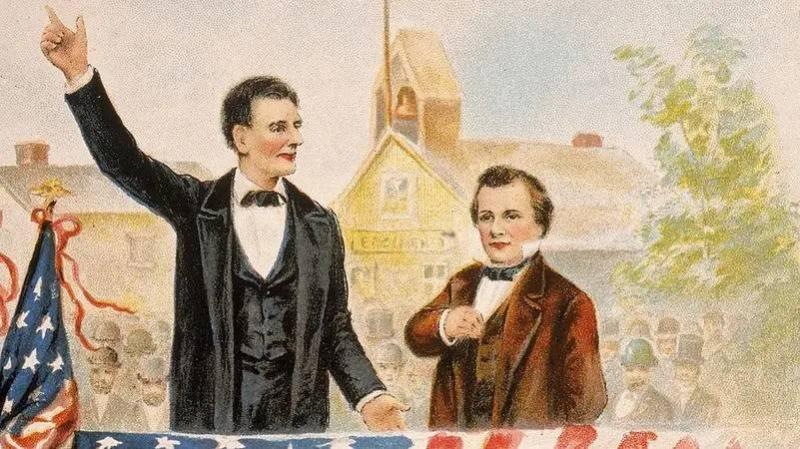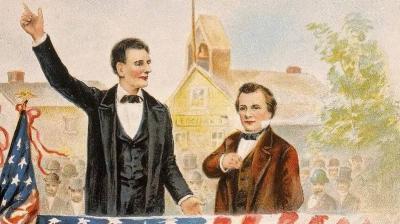During the 1860 U.S. presidential election, Republican candidate Abraham Lincoln easily defeated his Southern Democratic opponent John C. Breckinridge, securing 180 electoral votes compared to 72 for Breckinridge. This election triggered a crisis in the country as Lincoln's victory accelerated the secession of Southern states and their declaration of independence, leading to the American Civil War, which resulted in the deaths of over 600,000 individuals.
Lincoln's electoral success was largely attributed to what came to be known as the Great Debates of 1858. During that time, Lincoln engaged in seven debates against Democratic opponent Stephen A. Douglas in a bid for the Illinois Senate seat. These debates significantly raised Lincoln's profile and popularity across the nation.
**The Seven Debates**
Between August and October of 1858, Lincoln and Douglas participated in seven electoral debates across various locations in Illinois. During this campaign, the two candidates traveled a distance of 4,000 miles throughout the state in hopes of garnering public support. While Lincoln traveled by train, horse-drawn carriages, and boats, his opponent Douglas used a special train equipped with a cannon, which he fired to draw attention each time he arrived in a new area.
All seven debates followed a similar format. One candidate would deliver an opening statement for one hour, followed by the other candidate responding with a speech lasting an hour and a half. Finally, the first candidate would get half an hour to refute the responses of their opponent. Despite their lengthy durations, these debates resembled festivals, attracting large crowds estimated at around 20,000 spectators in various regions. Thanks to the advancements in journalism, telegraphy, and railways at the time, the candidates’ arguments drew significant national attention, especially regarding the contentious issue of slavery, which divided the nation into opponents and supporters.
**Lincoln's Rising Popularity**
Throughout the seven debates, the candidates exchanged accusations on various issues. In the first debate in Ottawa, Illinois, Douglas accused Lincoln of running as a "black Republican" and attributed to him views on abolishing the death penalty. Meanwhile, Lincoln accused Douglas of supporting the Supreme Court's Dred Scott decision, which denied citizenship to people of African descent, free or enslaved, and accused him of attempting to legalize slavery nationwide and violating congressional decisions.
In another debate in Freeport, the two candidates clashed over the question of states’ rights regarding the continuation or abolition of slavery. As the debates progressed, tensions escalated, particularly after Douglas accused Lincoln of trying to grant citizenship to all individuals of African descent and of endorsing interracial marriage. Lincoln responded by emphasizing that he never addressed the issue of rights and equality between blacks and whites in American society.
Despite his defeat in the 1858 election for the Illinois Senate seat, Lincoln gained significant popularity through these seven debates and emerged as an important national figure in the slavery debate. This ultimately enabled him to secure the support of the Republican Party for the 1860 presidential election, which he won just months before the outbreak of the Civil War.




